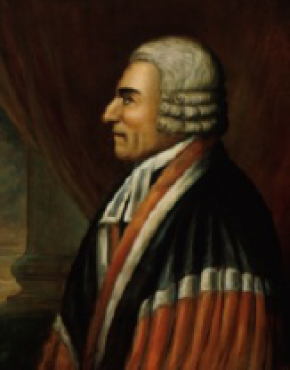You are here
Circuit Court Opinions:
Associate Justice William Cushing, The Mary Ford (1796)

The Mary Ford, 16 F. Cas. 981 (C.C.D. Mass. 1796) (No. 9,212a) [Eastern Circuit], affirmed, 3 U.S. 188 (1796)
In 1794, the American ship George came upon an abandoned vessel, the Mary Ford, on the high seas. The ship’s crew had disappeared, and most of its cargo was gone. The crew of the George took control of the Mary Ford and, with the assistance of two men from a nearby fishing vessel, towed her to the port of Boston. Under the common law of salvage, those rescuing a ship or its cargo lost at sea were typically entitled to a portion of the property or the proceeds thereof if the property was sold. The owners of the George filed a salvage claim in the U.S. District Court for the District of Massachusetts.
After the filing of the salvage claim, a British consul filed a claim on behalf of the British merchants who had originally owned the Mary Ford, asserting that they were entitled to whatever remained of the property after the salvage claim was paid. This was followed by another claim by a French consul, who alleged that the Mary Ford had been captured by a squadron of French ships during hostilities between Great Britain and France. The French sailors took the crew prisoner and raided most of the cargo, then abandoned the ship after attempting unsuccessfully to burn it.
U.S. District Judge John Lowell made a salvage award to the owners of the George of one-third of the property’s value. The remaining two-thirds, he ruled, would go to the original British owners of the Mary Ford. Lowell acknowledged the general principle of the law of nations that a neutral nation should not rule on the legality of a capture when the two nations involved were at war and that “neutrals are always to take the existing state of things as right.” Therefore, had the French remained in possession of the Mary Ford, they would have been entitled to the residue of the property. Because the French had abandoned the vessel, however, Lowell found that their capture was incomplete.
The French appealed Lowell’s judgment, and the case came before Justice William Cushing in the U.S. circuit court. Cushing disagreed with Lowell’s analysis, holding that the French became the owners of the Mary Ford “by conquest, and the right of war” and would remain so unless they were divested of the property by recapture. An abandonment of the ship by the French, he ruled, could not be considered a recapture by the British owners. The Supreme Court unanimously affirmed Cushing’s decision, holding that “immediately on the capture, the captors acquired such a right, as no neutral nation could justly impugn or destroy.” The case highlighted the role of the early federal courts in ruling on competing claims by foreign nations when exercising their admiralty jurisdiction.
